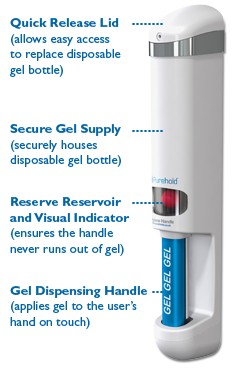Enforcing Hand Hygiene: The Pure Hold Hygiene Handle

In the food and drink industry cleanliness is undoubtedly one of the most important things to maintain at a high standard. Actions such as cleaning down surfaces both before and after food preparation as well as other things that should become second nature––such as wearing a hair net and washing hands before handling food––are frequently highlighted as crucial. These actions are undoubtedly vital and do help to prevent contamination. However, you can never be too careful. Sufficiently thorough hand hygiene is absolutely vital, and the stakes related to maintaining high standards of hand hygiene are huge.
Food cleanliness is often––quite literally––in the hands of the worker, meaning the person handling the food or ingredients. Therefore, food safety relies on trusting workers to maintain a rigorous hand hygiene regimen. If an employee returns to the production line or kitchen after visiting the restroom, they may think they washed their hands sufficiently and are fine to return to handling food. However, statistics and reports suggest we are not as responsible nor as thorough as we ought to be when it comes to hand hygiene. Although workers in food production and processing facilities are likely to maintain better hand hygiene due to the nature of their work than the average person, statistics and research on the standards of hand washing in the United Kingdom (UK) as a whole do paint a worrying picture.
A report released by Initial Washroom Hygiene to coincide with Global Handwashing Day in October found that one in four people admitted not washing their hands after visiting the restroom. Another study showed that over ten percent of people don’t wash their hands, and of those who do wash, 95 percent fail to do so properly because only two out of three of them actually use soap. Another disappointing report showed that on average, more than one in four Britons have fecal matter on their hands.[1]
The key to maintaining hand hygiene is to reaffirm the importance of washing ones hands properly but also to take further steps to not just encourage hand hygiene, but to enforce it.
 This is where the benefits of products that enforce hand hygiene really come to the forefront. Products such as the Hygiene Handle––a dynamic and clever new product developed by Pure Hold––help to guarantee the implementation of sufficient hand hygiene. The Pure Hold Hygiene Handle helps to reduce the risks that would exist with relying on workers being able to consistently attain suitably clean hands.
This is where the benefits of products that enforce hand hygiene really come to the forefront. Products such as the Hygiene Handle––a dynamic and clever new product developed by Pure Hold––help to guarantee the implementation of sufficient hand hygiene. The Pure Hold Hygiene Handle helps to reduce the risks that would exist with relying on workers being able to consistently attain suitably clean hands.
The handles are a great way to use new technology to ensure a high level of cleanliness is consistently achieved in the factory.” says Ardo UK’s operations director.
 The Hygiene Handle is able to minimize the risk of contaminants entering food processing areas by ensuring that each person that enters food production areas has clean hands. It does this by applying sanitizing hand gel to the user’s hand as they open the area entry door. It complements existing hand hygiene procedures by ensuring that cross contamination at the point of entry is no longer an issue. It acts as a sort of final barrier to prevent contaminants entering processing or production areas.
The Hygiene Handle is able to minimize the risk of contaminants entering food processing areas by ensuring that each person that enters food production areas has clean hands. It does this by applying sanitizing hand gel to the user’s hand as they open the area entry door. It complements existing hand hygiene procedures by ensuring that cross contamination at the point of entry is no longer an issue. It acts as a sort of final barrier to prevent contaminants entering processing or production areas.
This product is also able to provide a remedy to some of the more paradoxical elements of hand hygiene. For example, by enforcing compliance as users leave a bathroom, the risks associated with touching a contaminated door handle even after washing one’s hands become immaterial. The Pure Hold Hygiene Handle therefore provides a situation of compulsory and unavoidable hygiene compliance.
 The maintenance of high levels of hand hygiene ensures that food handled does not become contaminated but also has further benefits. It is clear that a more hygienic personal practice by employees will result in fewer sick days. The economic benefits to a company or institution of lower levels of worker absence are clear. In the food processing and production industry––as with other industries across the UK and increasingly abroad––hygiene supervisors are identifying the tangible benefits of installing the Pure Hold Hygiene Handle. This is part of a wider trend which has seen an improved appreciation of the financial advantages of maintaining a healthier workforce.
The maintenance of high levels of hand hygiene ensures that food handled does not become contaminated but also has further benefits. It is clear that a more hygienic personal practice by employees will result in fewer sick days. The economic benefits to a company or institution of lower levels of worker absence are clear. In the food processing and production industry––as with other industries across the UK and increasingly abroad––hygiene supervisors are identifying the tangible benefits of installing the Pure Hold Hygiene Handle. This is part of a wider trend which has seen an improved appreciation of the financial advantages of maintaining a healthier workforce.
The feedback from our employees has been positive and customer technologists have been impressed.” says Ardo UK’s technical director.
It is perhaps obvious that productivity will be lower with higher levels of employee absence. But research suggests figures that may be surprising. The Chartered Institute of Personnel and Development (CIPD) estimates that sickness-related absences cost 6.4 days or £666 per employee per year.[2] The Health and Safety Executive meanwhile reported in 2012 that 22.7 million days were lost due to work-related illness, costing society an estimated £8.4 billion. The same report found the financial cost to employers of workplace illness (and injury) in 2011 to be almost £3 billion.
Even if the majority of employees claim ostensibly that they maintain adequate levels of hand hygiene, these figures suggest an expensive state of affairs for employers. It is likely that many of these sick days are avoidable, with better hand hygiene and cleaner surfaces able to make a real difference. The Hygiene Handle assists with both such factors.
To learn more about Pure Hold’s Hygiene Handle, visit PureHold.co.uk.
References
1. Dr. Curtis, the director of the Hygiene Centre at the University of London in The Sunday Times, November 17, 2008 by Hannah Fletcher.
2. http://www.cipd.co.uk/NR/rdonlyres/45894199-81E7-4FDF-9E16-2C7339A4AAAA/0/4926AbsenceSRWEB.pdf.
Looking for a reprint of this article?
From high-res PDFs to custom plaques, order your copy today!




